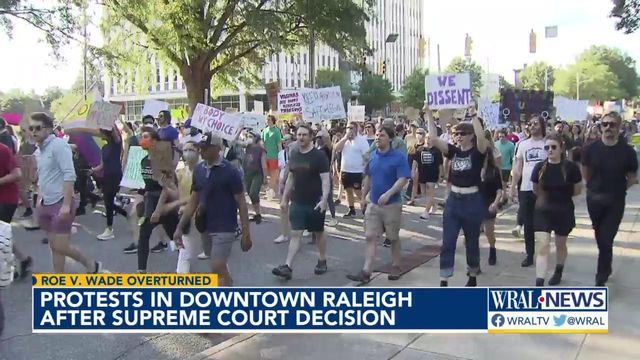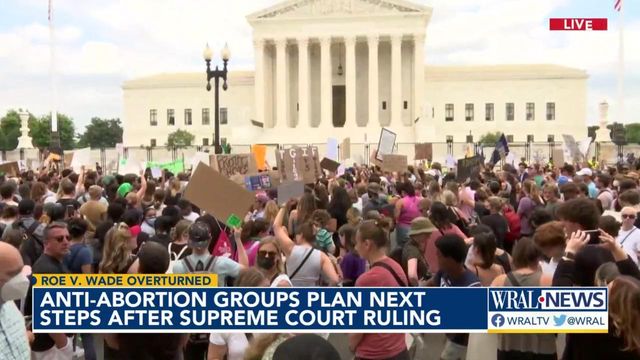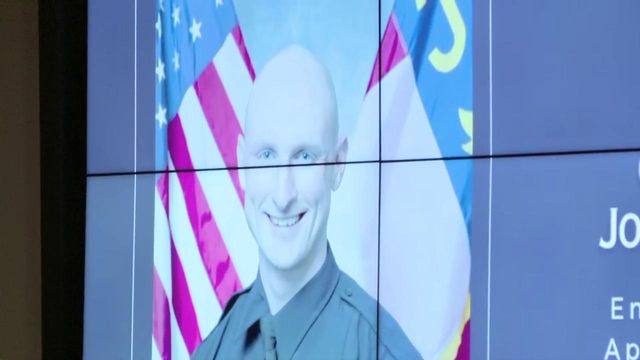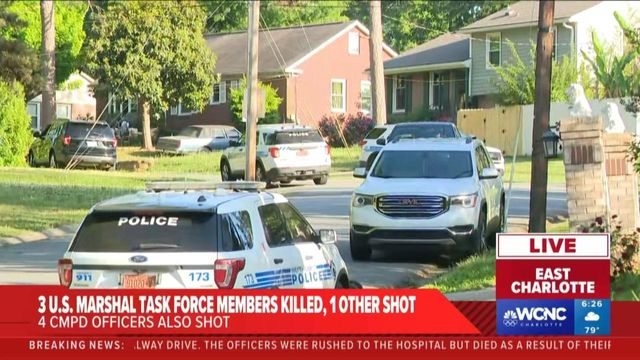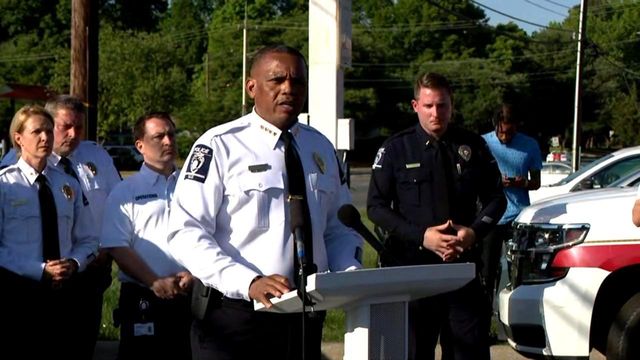Abortion rights activists take to the streets in downtown Raleigh as anti-abortion advocates celebrate
The U.S. Supreme Court decision on Friday to overturn Roe v. Wade prompted an emotional response in just about everyone who heard about it. For 50 years, the court had protected a woman's right to have an abortion.
Now, for millions of women living in 13 U.S. states, that right was stripped away.
A majority of Americans and North Carolinians believe that women should maintain their right to abortion, which is why the latest ruling caused shock and despair for many across the country.

"Women should have the right to their body. It's their body," said Durham resident Alexis Landa. "No man or anyone on this planet has the right to tell someone when and where they can have a child, and that they have to keep it."
"I am really disheartened by the decision, and I think it’s a little bit of a frightening move when it comes to women’s rights and women’s choice to choose what is best for their body and healthcare," said Vance County resident Ella Bess Marshall. "This will be one of those situations where you know where you were at the moment something this momentous happened."
Abortion rights activists take their voices to the streets
Friday evening, protesters filled the entirety of the Bicentennial Plaza in downtown Raleigh.
Their voices directed both across the street at lawmakers, and across the state.
From the streets of downtown to bridges across town, signs of frustration, anger and determination as the Supreme Court rolls back abortion rights.
Friday's decision brought thousands of activists to downtown Raleigh.
Women like Michele McIntosh who said this is a fight that's beyond personal.
"My mother fought for reproductive rights her entire adult life, because her own mother had to give herself an abortion during the great depression because they couldn't afford another child," said McIntosh. "No woman should have to provide herself and abortion like that."
Many who came Friday remembered the day Roe V. Wade was decided.
"I was thrilled, I was happy," said Patrice Walence.
Walence said now she fears for her children and grandchildren.
"We elected democrats to do something for our country, [they] need to do it," said Walence.
Protesters took their message on the move.
The line filling the street, stretching for nearly five blocks.
Above 440, activists hung signs reminding people that abortion is still legal in North Carolina.
But back at the plaza, organizers told the crowd that it might not be the case much longer.
The groups were pushing two solutions: Organize and vote.
Democratic leaders and activists worry that Friday's decision is one step closer to rolling back gay rights and limiting access to contraceptives.
Anti-abortion advocates look ahead after Supreme Court decision
For conservative activists who've been tirelessly fighting against the right to abortion, Friday's decision was a win.
Friday was a day filled with strong emotions as anti-abortion advocates celebrated the ruling that made abortion no longer a woman's constitutional right.
Tonya Baker Nelson, founder of Hand of Hope Pregnancy Centers with locations in Fuquay-Varina, Raleigh and Fayetteville, said. "This is the day that pro-life men and women and children have prayed for, for over 50 years."
At Hand of Hope Pregnancy Center, Nelson said she educates women on what an abortion is and then empowers those women on making a decision that she "hope[s] would be life."
Nelson said she too was once faced with the same decision millions of women face – and ultimately she chose to keep her baby.
"I’ve been pressured ... my fiancé saying 'you either have this abortion or our relationship is over'," said Nelson. "It is an intense amount of pressure."
Despite the hundreds and thousands of protesters locally and across the country, anti-abortion advocates call this a victory for unborn babies.
Nelson said that Friday's decision isn't the end of her activism.
Some in North Carolina are calling for the state to put more restrictive abortion laws into place.
"Unborn babies are already protected because of this ruling but in North Carolina, unfortunately, we have abortion that's allowed by statutes and court rulings up to 24 weeks," said anti-abortion advocate Tami Fitzgerald. "So we have a lot of work to do in North Carolina to return to being pro life."
With an emphasis on legislative change, some anti-abortion organization directors are now focused on ramping up alternatives to abortion.
But those working to help women get access to abortion understand the battle they have ahead of them. The Guttmacher Institute, a research group that supports abortion rights, estimated that overturning Roe v. Wade would result in a 4,672% increase in the number of women whose nearest abortion provider would be in North Carolina.
Kelsea McLain, who lives in Durham, works for the Triangle Abortion Access Coalition, said Friday she can't help but "think about all of the people who are going to be forced to continue pregnancies, or go through astronomical leaps and bounds to find a place where they can safely terminate their pregnancy in the wake of this ruling."
McLain said she's had three abortions in her life.
"For me it was a very easy choice, it was a simple choice, and it was one I did not need the government intervening in or interfering with," she said.
She doesn't regret her decision, and is "eternally grateful" for the fact that she did a medicated abortion. That means McLain didn't have to go through a surgical procedure, but instead took an abortion pill.
"North Carolina is currently a state that will be receiving and supporting people in states that have trigger bans. So it’s going to be even more vital for us to protect it here," she said.

